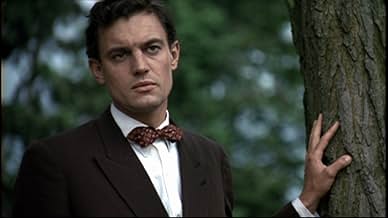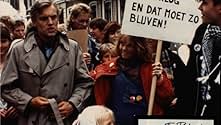NOTE IMDb
7,2/10
3,5 k
MA NOTE
Ajouter une intrigue dans votre langueA Dutch doctor, haunted by grueling childhood memories of World War II, struggles to find peace as he spends his life looking for answers about the tragic night that shaped him.A Dutch doctor, haunted by grueling childhood memories of World War II, struggles to find peace as he spends his life looking for answers about the tragic night that shaped him.A Dutch doctor, haunted by grueling childhood memories of World War II, struggles to find peace as he spends his life looking for answers about the tragic night that shaped him.
- Réalisation
- Scénario
- Casting principal
- Récompensé par 1 Oscar
- 5 victoires au total
John Kraaijkamp Sr.
- Cor Takes
- (as John Kraaykamp)
Akkemay Elderenbos
- Sandra
- (as Akkemay)
Avis à la une
The film and the book, are really very much the same here. I read the book first and then watched the film and I have really not much to say about both. They are both of the same quality, for both book and film feature the same amount of accidental meetings which are after a while quite unbelievable and that is all the criticism I have. The film has of course certain things which are better than the book, for instance it is more exciting, but then again the film also has it's downsides, for sometimes the acting is not that great. But overall the better and worse things level each other out so my verdicts for book and film are the same: pretty good.
If you like Mulisch's books and are interested in World War 2 read De Zaak 40/61.
7 out of 10
If you like Mulisch's books and are interested in World War 2 read De Zaak 40/61.
7 out of 10
In January 1945, during the second world war, the Dutch resistance kills a collaborator in the street where the 12 year old Anton Steenwijk lives. The man was shot in front of his neighbors house, but is moved by them to the house of the family Steenwijk. Because of this, his father, mother and brother are killed by the Germans, and their house is set to fire. During his life, Anton meets several people that tell him more about what really happened on the night of the assault.
What really makes this a great film is how it covers so much of the 20th century, at least the major war events. Vietnam, Stalin, Hungary and more... this is not just a story about the Netherlands in World War II, but really a larger tale of Europe. The balance between the personal and the international is what makes it such a notable film.
What really makes this a great film is how it covers so much of the 20th century, at least the major war events. Vietnam, Stalin, Hungary and more... this is not just a story about the Netherlands in World War II, but really a larger tale of Europe. The balance between the personal and the international is what makes it such a notable film.
I have seen this movies so many times that the subtitling has become irrelevant. Smarty movie with worldwide appeal. A growing up MD is subconciously living a life that has been dramatically changed by an incident during the WWII. such powerful characters. I walk out the movuie stunned at the way the movie works for me. go and see it for yourself
10rob-1944
My family is from Haarlem and I feel very close to the places, scenes, characters and the atmosphere that the movie generates. The fact that there are only a view productions regarding the Dutch resistance is very sad to me as the Dutch resistance was on of the best organized during the German occupation. However the man that was shot dead outside Anton Steenwijk's house was an NSB participant. He belonged to the Dutch Nazi Party. As previously stated, by some people in this thread, he was not a German Nazi but a Dutch collaborator. A lot of my family were in the resistance during the Nazi occupation. Some of them were shut by the Germans, in the dunes near Bloemendaal a/Zee, the site of the "Ere Begraaf Plaats" where Anton takes his daughter to find Truus Koster's grave, in the latter end of the movie. When I was young we often spend time there, to visit friends and family that were executed during those troublesome years. I dearly love this movie and would recommend it to anyone.
This film is based on the Harry Mulisch novel, and both have some distinguishing characteristics that go back - on purpose - to classic Greek tragedy theatre. The incredible co-incidence that carries the story is reminiscent of ancient literary 'vehicles' that carry a story. Thus, you should not look at the chance events as being part of the story, but as being the foundation for the story - they, in themselves, should not really be questioned.
Also, note that every chance meeting is preceded by a meeting with some kind of stone. The Dutch word for dice is 'dobbelsteen', or dicing-stone, so that the simile of dice and chance can be extended to stones and chance. This explains the significance of Anton meeting his first wife while visiting the Stone of Scones.
The book, more strongly than the film, is also constructed as a Greek tragedy, with a prologue, five acts and then an epilogue.
Anton Steenwijk is also interesting himself: he represses the events of the assault, but it keeps coming back at him. But he is an anaesthetist in more than one way - he puts his memories to sleep. Even in the final stages, when the story is already quite clear to him, he uses drugs at his house in Tuscany and seeks to ease a toothache in Amsterdam before going to the Ban the Bomb demonstration.
Personally, I think the book was translated into a film in brilliant fashion. My major qualm with it is the mediocrity of the sound and sound effects. Some pretty good acting and a fantastic storyline make this one well worth the watch.
Also, note that every chance meeting is preceded by a meeting with some kind of stone. The Dutch word for dice is 'dobbelsteen', or dicing-stone, so that the simile of dice and chance can be extended to stones and chance. This explains the significance of Anton meeting his first wife while visiting the Stone of Scones.
The book, more strongly than the film, is also constructed as a Greek tragedy, with a prologue, five acts and then an epilogue.
Anton Steenwijk is also interesting himself: he represses the events of the assault, but it keeps coming back at him. But he is an anaesthetist in more than one way - he puts his memories to sleep. Even in the final stages, when the story is already quite clear to him, he uses drugs at his house in Tuscany and seeks to ease a toothache in Amsterdam before going to the Ban the Bomb demonstration.
Personally, I think the book was translated into a film in brilliant fashion. My major qualm with it is the mediocrity of the sound and sound effects. Some pretty good acting and a fantastic storyline make this one well worth the watch.
Le saviez-vous
- GaffesToutes les informations contiennent des spoilers
- Citations
Anton Steenwijk: My parents were innocent.
Fake Ploeg: My father was too!
Anton Steenwijk: I only know what I was told.
Fake Ploeg: Exactly.
- ConnexionsFeatured in The 44th Annual Golden Globe Awards (1987)
Meilleurs choix
Connectez-vous pour évaluer et suivre la liste de favoris afin de recevoir des recommandations personnalisées
- How long is The Assault?Alimenté par Alexa
Détails
Box-office
- Montant brut aux États-Unis et au Canada
- 512 403 $US
- Montant brut mondial
- 512 403 $US
- Durée2 heures 21 minutes
- Mixage
- Rapport de forme
- 1.66 : 1
Contribuer à cette page
Suggérer une modification ou ajouter du contenu manquant
























